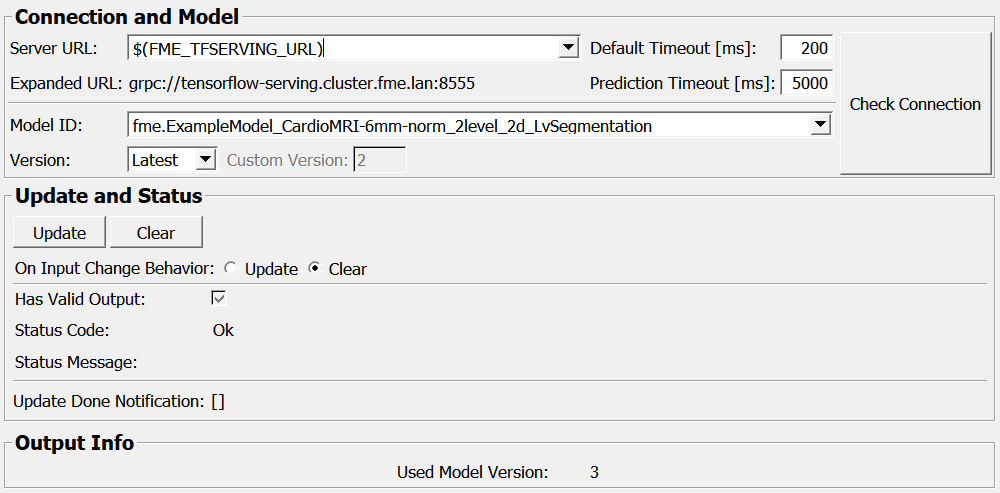TensorFlowServingTileProcessor¶
-
MacroModule¶ genre ML_Inference_Providersauthor Jan-Martin Kuhnigkpackage FMEstable/ReleaseMeVisdefinition TensorFlowServingTileProcessorModule.def see also ApplyTileProcessor,ApplyTileProcessorPageWisekeywords RedLeaf,remote,deeplearning,deep,machine,learning,inference,provider,grpc,client,server,classif,TFS,infer,predict,TensorFlowServingTileClassifier
Purpose¶
Connects to remote TensorFlow Serving inference server to process voxels tile by tile as fed by ApplyTileProcessorPageWise.
Usage¶
Assuming you have a TensorFlow Serving inference server running, enter its URL into Server URL (e.g. http://localhost:8501), and enter the Model ID you want to use.
You can also check if the connection is possible and the model was found by pressing the Check Connection button, which, if successful, will list all versions available for the current model and all outputs available for the currently selected model version.
Then press Update to set up the processor.
Connect to an ApplyTileProcessorPageWise and make sure to edit the output tile size, padding and dimension mapping. See ApplyTileProcessorPageWise help for more details.
See the example network on how to apply these modules to process images.
Tips¶
If supported by your server and client setup, use GRPC for better performance.
Output Fields¶
outCppTileProcessor¶
-
name:outCppTileProcessor, type:PythonTileProcessorWrapper(MLBase), deprecated name:outCppTileClassifier¶ Provides a C++ TileProcessor wrapping the python object communicating with the TensorFlow Serving backend. Usually to be connected to
ProcessTilesorApplyTileProcessor.
Parameter Fields¶
Field Index¶
[]: Trigger |
On Input Change Behavior: Enum |
Version: Enum |
Clear: Trigger |
outAvailableModels: String |
|
Custom Version: Integer |
Prediction Timeout [ms]: Integer |
|
Default Timeout [ms]: Integer |
Server URL: String |
|
doNotClearOnFailedUpdate: Bool |
Status Code: Enum |
|
Expanded URL: String |
Status Message: String |
|
Has Valid Output: Bool |
Update: Trigger |
|
Model ID: String |
Used Model Version: Integer |
Visible Fields¶
Server URL¶
-
name:inServerUrl, type:String, default:$(FME_TFSERVING_URL), deprecated name:inServer¶ URL the TF serving inference server is to be contacted on (e.g. grpc://localhost:8500 or http://localhost:8501). The prefix (grpc:// or http://) determines the protocol to be used. You can use MDL variables here e.g. ‘$(MY_TFS_SERVER_URL)’, for example defined in the mevislab.prefs.
Expanded URL¶
-
name:outExpandedServerUrl, type:String, persistent:no¶ Expanded version of the
Server URL
Prediction Timeout [ms]¶
-
name:inPredictionTimeout_ms, type:Integer, default:2000, minimum:-1, deprecated name:inTimeout\_ms¶ Timeout (in milliseconds) for a tile prediction request. As prediction can take a long time depending on the used model and inference server performance, this value can be chosen independently from the default communication timeout.
Default Timeout [ms]¶
-
name:inDefaultTimeout_ms, type:Integer, default:200, minimum:-1¶ Timeout (in milliseconds) for all server communication except tile prediction requests.
Model ID¶
-
name:inModelId, type:String, deprecated name:inModelName¶ Model ID to load on the server, including potential namespaces/hierarchies separated by ‘.’ (e.g. fme.MyModel.sagittal).
Version¶
-
name:inModelVersionSelectionMode, type:Enum, default:Latest¶ Version selection mode
Values:
| Title | Name | Description |
|---|---|---|
| Latest | Latest | Choose latest model (highest version number) available |
| Custom | Custom | Select custom model version |
Custom Version¶
-
name:inCustomModelVersion, type:Integer, default:1, minimum:1¶ Custom model version (integer > 0).
Used Model Version¶
-
name:outUsedModelVersion, type:Integer, persistent:no¶ Indicates the model version actually used.
On Input Change Behavior¶
-
name:onInputChangeBehavior, type:Enum, default:Clear, deprecated name:shouldAutoUpdate,shouldUpdateAutomatically¶ Declares how the module should react if a value of an input field changes.
Values:
| Title | Name | Deprecated Name |
|---|---|---|
| Update | Update | TRUE |
| Clear | Clear | FALSE |
[]¶
-
name:updateDone, type:Trigger, persistent:no¶ Notifies that an update was performed (Check status interface fields to identify success or failure).
Has Valid Output¶
-
name:hasValidOutput, type:Bool, persistent:no¶ Indicates validity of output field values (success of computation).
Status Code¶
-
name:statusCode, type:Enum, persistent:no¶ Reflects module’s status (successful or failed computations) as one of some predefined enumeration values.
Values:
| Title | Name |
|---|---|
| Ok | Ok |
| Invalid input object | Invalid input object |
| Invalid input parameter | Invalid input parameter |
| Internal error | Internal error |
